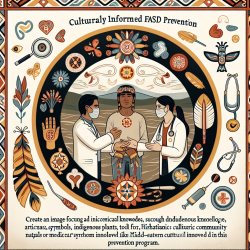Introduction
Fetal Alcohol Spectrum Disorder (FASD) prevention is a critical public health concern, particularly in Indigenous communities where historical trauma has compounded the challenges faced by families. The Truth and Reconciliation Commission's Call to Action #33 highlights the need for culturally appropriate FASD prevention programs developed in collaboration with Indigenous peoples. This blog explores how practitioners can enhance their skills and impact by integrating the principles outlined in the research paper "Collaborative Action on Fetal Alcohol Spectrum Disorder Prevention: Principles for Enacting the Truth and Reconciliation Commission Call to Action #33."
Understanding the Eight Tenets
The Consensus Statement developed from the research outlines eight tenets that guide the creation of culturally informed FASD prevention programs:
- Centering Prevention around Indigenous Knowledge and Wellness: Programs should integrate Indigenous worldviews and wellness models, emphasizing land, lineage, and language.
- Using a Social and Structural Determinants of Health Lens: Addressing the broader social and structural factors affecting health to support women's wellness and healing.
- Highlighting Relationships: Recognizing the role of extended family and community in child development and socialization.
- Community-Based and Community-Driven: Programs should be tailored to the specific needs and wisdom of the community they serve.
- Provision of Wraparound Support and Holistic Services: Coordinating community supports to meet the complex needs of women and families.
- Adopting a Life Course Approach: Recognizing the sacred role of pregnancy and childbirth within Indigenous cultures.
- Models Supporting Resiliency for Women, Families, and Communities: Using strengths-based approaches to empower individuals and communities.
- Ensuring Long-Term Sustainable Funding and Research: Advocating for sustained funding and research that respects Indigenous knowledge systems.
Implementing the Tenets in Practice
Practitioners can enhance their skills by actively engaging with these tenets. This involves recognizing the importance of integrating Indigenous knowledge systems and fostering relationships within the community. Programs like the Circle of Life Mentorship Program and the Stó:l? Family Empowerment Team exemplify how these principles can be applied effectively. By focusing on cultural connection and community-driven approaches, these programs have successfully created supportive environments for families.
Encouraging Further Research
For practitioners interested in deepening their understanding, further research into the Consensus Statement and its application in various communities is encouraged. By doing so, practitioners can contribute to the ongoing dialogue and development of effective FASD prevention strategies that are culturally informed and community-centered.
To read the original research paper, please follow this link: Collaborative Action on Fetal Alcohol Spectrum Disorder Prevention: Principles for Enacting the Truth and Reconciliation Commission Call to Action #33.










